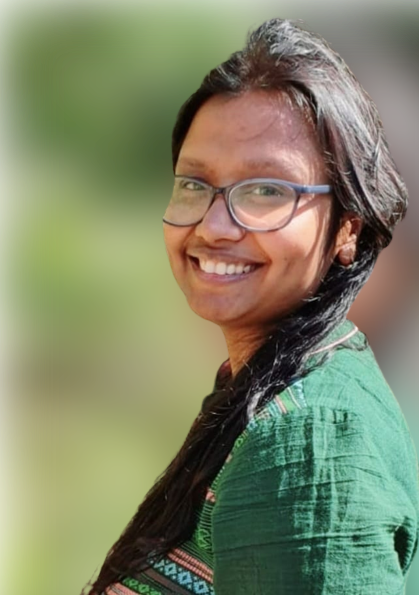Dr. Indrani Karmakar

-
Phone:+49 371 531-32923
-
Email:
-
Address:Reichenhainer Straße 39, 09126 Chemnitz
-
Room:C46.215 (prev. 2/39/215)
-
Office hours:By appointment
Main Areas of Research
- Postcolonial Literature
- Diaspora and migration
- Women's Studies
- British Muslim Writing
- Refugee Narratives
Career/Job History
| Dates | Career Path |
|---|---|
| Present | Academic Staff Member, Chair of English Literature, Chemnitz University of Technology, Germany |
| 2021-2023 | Alexander von Humboldt Postdoctoral Fellow, Chemnitz University, Germany |
| 2019-2021 | Andrew W. Mellon Postdoctoral Fellow, Rhodes University, South Africa |
| 2018-2019 | Research Associate: Project ‘Storying Relationships: The Stories and Practices of Young British Pakistani Muslims’, University of York, UK |
| 2013 – 2018 | PhD, University of York, UK |
| 2017-2019 | Graduate Teaching Assistant: University of York, UK |
| 2012 | MLitt, University of Dundee, UK |
| 2009 | MA, University of Calcutta, India |
Publications
Monographs
Karmakar, Indrani. Maternal Fictions: Writing the Mother in Indian Women’s Fictions. London: Routledge, 2022.
Reviewed by: Xin Liu. Contemporary Women's Writing, Volume 18, Issue 2, 2024, Pages 156– 158, https://doi.org/10.1093/cww/vpae028
Reviewed by: Pratyusha Pramanik. Global South Literary Studies. Pages 1– 3, https://doi.org/10.1080/30684781.2026.2632896
Phillips, R., I. Karmakar and others. Storying Relationships: Young British Muslims Speak and Write about Sex and Love. London: Zed, 2021.
Reviewed by: Tucker, A. Tucker, A. (2022). Gender, Place & Culture, 30(6), 896–899. https://doi.org/10.1080/0966369X.2022.2055917
Editorial Work
Cecile Sandten, Indrani Karmakar, Oliver von Knebel Doeberitz (eds.) Contemporary Indian English Literature: Context - Authors - Genres - Model Analyses. Eds. Tübingen: Narr, 2024.
Articles in Peer Reviewed Journals
Karmakar, Indrani. “Of Women’s Bonds: Female Friendship and Feminist Ethics of Care in Tabish Khair’s Just Another Jihadi Jane”, Wasafiri, 36:3, 51-58, DOI: 10.1080/02690055.2021.1918437
Karmakar, Indrani. “Being a Foreigner … Is a Sort of Lifelong Pregnancy: Interrogating the Maternal and the Diasporic in Jhumpa Lahiri's The Namesake”, Scrutiny2, 24:1, 44-57, DOI: 10.1080/18125441.2019.1650821
Karmakar, Indrani. “Motherhood beyond Biology: Two Indian Women Writers’ Fictions of Non-Biological Motherhood.” The Journal of Commonwealth Literature, Apr. 2019, doi:10.1177/0021989419838018
Karmakar, I and C. Chambers “Writing the Mother in Anita Desai’s Where Shall We Go This Summer”. Moving Worlds: A Journal of Transcultural Writings, vol. 17, no. 2, 2017: pp. 16-26.
Book Chapters
Karmakar, I. "Writing Women in India: Critical Perspectives on Shashi Deshpande’s Selected Fictions". Contemporary Indian English Literature: Contexts - Authors - Genres - Model Analyses. Tübingen: Narr, 2024: 59-82.
Karmakar, I and C. Chambers. “The Virgin’s Consent: British Muslim Identity, Cultural Heritage, and Gender in Young Adult Fiction.” Postcolonial Youth in Contemporary British Fiction. Eds. Laura Mª Lojo-Rodriguez, Jorge Sacido-Romerio; Noemi Pereira-Ares. Leiden: Brill, 2021.
Karmakar, I. “Transitional Figures: Partition, Victimhood and Agency in Jyotirmoyee Devi’s Fictions”. Women in Transition: Crossing Borders, Crossing Boundaries. Eds. Claire Williams and Maria- José Blanco. London: Routledge, 2021.
Karmakar, I. “Mothers’ Voice from the Margin: Motherhood, Class and Caste in Mahasweta Devi’s Two Short Stories”. Mothers Without Their Children. Eds. Charlotte Beyer and Andrea Robertson. Ontario: Demeter Press. 2019. 149-164.
Karmakar, I. “Mothering Daughters: Trajectories of Mother-Daughter Relationships in Ashapurna Debi’s The First Promise”. Gender (In) Equality: Literary, Linguistic, And Artistic Responses to Gendered Dominance. Ed. Nikica Mihaljević. Warsaw: IRF press, 2017. 169-192.
Review and Conference Reports
Karmakar, I. Review of Muslim Indian Women Writing in English: Class Privilege, Gender Disadvantage, Minority Status by Elizabeth Jackson. South East Asian Review of English, vol. 55, no. 2, 2018: pp. 297- 300.
Report on GAPS 2021 Annual Conference ‘Science, Culture, and Postcolonial Narrative’ (Link).
Report on Workshop 5: Motherhood in post-1968 European Literature Network (Link).
Conference Talks
|
Dates |
Conference Talk |
|---|---|
|
2021 |
“Mother in the Making: Commercial Surrogacy and the Politics of Motherhood in Meera Syal’s House of Hidden Mothers and Kishwar Desai’s Origins of Love”. Science, Culture, and Postcolonial Narratives GAPS Annual conference, University of Oldenburg, Germany. |
|
2018 |
Guest lecture and seminar “Moving Lives and Fragmented Freedom in Neel Mukherjee’s The State of Freedom”. School of Communication and Culture. Aarhus University, Denmak. |
|
2018 |
“Motherhood Beyond Biology: Representation of Nonbiological Motherhood in Two Literary Texts”, Women in Transition: Crossing Borders, Crossing Boundaries, Kings College London, UK. |
|
2017 |
“[B]eing a foreigner […] is a sort of lifelong pregnancy: Reconciling Fragmented Selves in Jhumpa Lahiri’s The Namesake, (Dis)Connected Forms: Narratives on the Fractured Self, University of Hull, UK. |
|
2016 |
“Mothering Daughters: Trajectories of Mother-Daughter Relationship in Ashapurna Debi’s The First Promise”, Gender Studies Conference, Interdisciplinary Research Foundation, Krakow, Poland. |
|
2015 |
“Mothers’ Voice from the Margin: Representation of Motherhood in Mahasweta Devi’s Fiction”, BASAS Annual Conference, University of Cambridge, UK. |
|
2014 |
“Nation and Mother: A Kristevan Reading of Anita Desai’s Where Shall We Go This Summer?”, Psychoanalysis, Culture and Society, Middlesex University, UK. |
Teaching
Present: Chemnitz University of Technology (Germany), English Department
- "Theories and Methods" (BA English)
- Migration, Diaspora and Home in Anglophone Literature (BA English)
- Reading Refugee Tales (MA English)
- Indian English Women Writers (MA English)
2019-2020: Rhodes University (South Africa), Department of Literary Studies in English
- Postcolonial Literature (BA English)
- The Sense of an Ending: Apocalyptic Genre Fiction (BA English)
2017-2018: University of York (United Kingdom), Department of English and Related Literature
- Global Literature (BA English)
- Slavery in the Transatlantic: Cultures, Representations, Legacies (BA English)
- A World of Literature I: Classics and Cultural Translations (BA English)
- A World of Literature II: Empire and Aftermaths (BA English)
- Key Concepts: An Introduction to Genre, Theory and Writing (BA English)
Professional Memberships
- Postcolonial Studies Association
- Association for Anglophone and Postcolonial Studies (GAPS)
- The European Association for Commonwealth Literature and Language Studies
